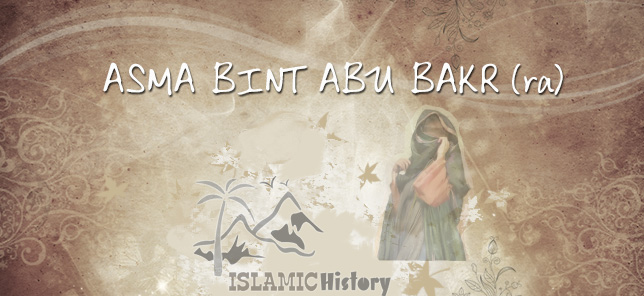Asma’ Bint Abu Bakr was the daughter of Abu Bakr as-Siddiq. She was the elder sister of ‘Aisha, the mother of the believers. She was the wife of the great companion Az-Zubair Ibn al-`Awâm and the mother of `Abdullah Ibn az-Zubair. She accepted Islam very early in Mecca. She gave a pledge to the Prophet (PBUH) and firmly believed in him.
Her Noble situations during Hijrah
Asmâ’ was called Zât an-Nitâqayn (the possessor of the two scarves) because she split her scarf into two parts in order to deliver food and water to the Prophet (PBUH) and her father, Abu Bakr in the Thawr cave when immigrating to Medina. When the Prophet (PBUH) set out for Medina accompanied by Asmâ’s father, the latter took all that he had of property and left nothing to his family. Then Abu Quhafa, Asmâ’s grandfather came to her and said, “This man (Abu Bakr) put you in adversity. He deprived you of himself and property.” Asma’ bravely replied, “No, He left so much to us.” She covered some stones and brought them to her blind grandfather and said, “This is what he left.” Thereby, the old man said, “There is no blame if left that.”
Abu Bakr was the only one who accompanied the Prophet during Hijrah. They concealed themselves in the cave of Thawr three miles from Makka, for three nights, with the enemy prowling around in great numbers in fruitless search of them. Asmâ’, the daughter of Abu Bakr provided them with food and water during their stay there.
Abu Jahl came furious and enraged with anger to enforce Asma’ to tell him the hidden place of her father. But she kept silent and faced him bravely. Failing to make her confess, he slapped her so violently that her necklace fell down. Then he had nothing to do but to leave enraged with anger. Asmâ’ soon joined the Muslim community at Medina. No sooner did she arrive there than she gave birth to her son, Abdullah, the first newborn Muslim in Medina.
An Example of Good Wife
At the beginning of her married life she was so poor that she had to serve her husband, Az-Zubair ibn al-Awwam, bake the bread, clean the home and feed the horse.
Narrated Asmâ’ bint Abu Bakr:
When Az-Zubair married me, he had no real property or anything else except a camel, which drew water from the well, and his horse. I used to feed his horse with fodder and drew water and sew the bucket for drawing it and prepare the dough, but I did not know how to bake bread. So our Ansari neighbouress used to bake bread for me, and they were honorable ladies. I used to carry the date stones on my head from Zubair’s land to him by Allah’s Messenger and this land was two third Farsakh (About two miles) from my house. One day, while I was coming with the date stones on my head, I met Allah’s Messenger along with some Ansari people. He called me and then, (directing his camel to kneel down) said, “Ikh! Ikh!” so as to make me ride behind him (on his camel). I felt shy to travel with the men and remembered Az- Zubair and his sense of Ghira (being jealous), for he had the greatest sense of Ghira of all the people. Allah’s Messenger (PBUH) noticed that I felt shy, so he proceeded. I came to Az-Zubair and said, “I met Allah’s Messenger (PBUH) while I was carrying a load of date stones on my, and he had some companions with him. He made his camel kneel down so that I might ride, but I felt shy in his presence and remembered your sense of Ghira. On that Az-Zubair said, “By Allah, your carrying the date-stones (and you being seen by the Prophet (PBUH) in such a state) is more shameful to me than your riding with him. (i.e. You should have obeyed the Prophet).'” (I continued serving in this way) until Abu Bakr sent me a servant to look after the horse, whereupon I felt as if he had set me free.”
Later on, Za-Zubayr became a wealthy man. His property was sold after his death for about forty million dirhams. She was so generous that when feeling ill she would wait until she recovered and then free her slaves.
Her Bravery & Patience
She took part in the battle of Yarmuk and fought bravely. She also kept a dagger to defend herself when thieves appeared in Medina at the time of Sa’id Ibn Al-‘As.
As for her fortitude, it can be represented in her words to her son, ‘Abdullah when consulting her about the Al-Hajjaj siege to Mecca. She was a hundred years old and was blind by then. ‘Abdullah addressed her saying, “O mother, the people abandoned me; only a few of them who still support me. However, they could no longer fight than an hour on my part.” The other party offers to give me whatever I ask of worldly benefits. What do you see, mother? She replied, “You know yourself best. If you realized that you are right and calling for the truth, you would better go on. It is the issue for which your fellows passed away. Do not surrender your neck to Banu Umayyah to play it. But if you just wanted a worldly benefit you would be the worst man who demolished himself and his fellows.’ Abdullah said, “By Allah, this is also my opinion, mother.” But I fear to surfer crucifixion after death.” She replied, “Skinning a slaughtered goat does not bring it pain.” Off you go and seek Allah’s help.”
When approaching to embrace him she found him wearing a shield. She said; “This is not the behavior of whoever wants what you want!” Therefore, he took off his shield and went forward to fight. He kept fighting until he was killed. Al-Hajjaj issued a command to have him crucified. Then he came to Asmâ’ and said, “O mother, the leader of the believer commanded me to treat you well. Do you want anything? She replied, “I am not your mother. I am only the mother of this crucified man.” Then she said, I heard the Messenger of Allah (PBUH) as saying, “There will be in Thaqeef a liar and a destroyer.” We knew the liar and there still you the destroyer. In another version when Al-Hajjaj came to Asmâ’ he said, “How did I punish your son, Asmâ’!?” She replied quietly, “You spoiled his life but he spoiled your next.”
Her Death
She (May Allah be pleased with her) died in Mecca shortly after the death of her son, ‘Abdullah. May Allah have mercy on her.

